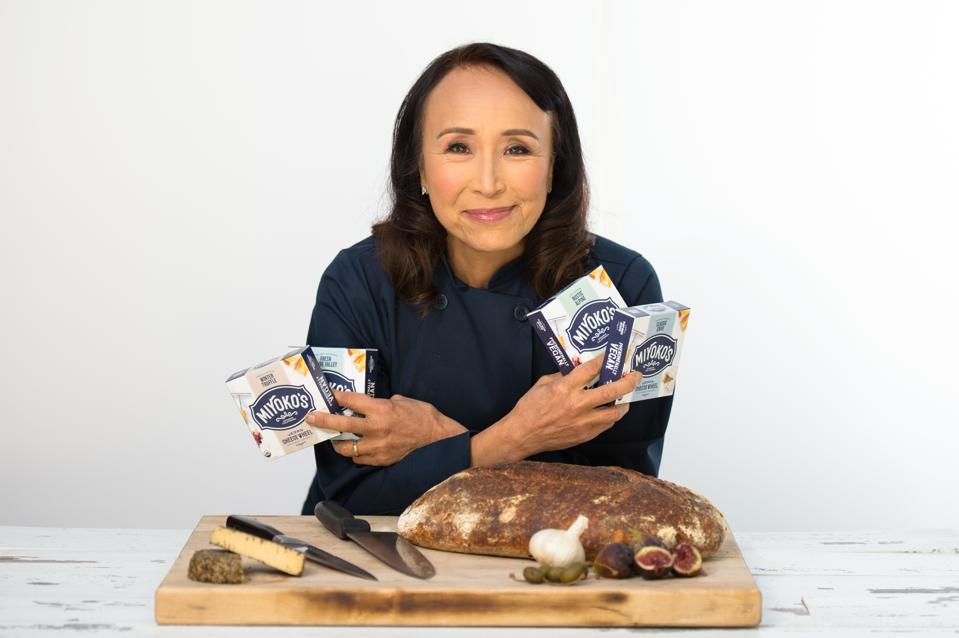“Vegan cheese has been the laughing stock of the food industry because it has been crap,” Miyoko Schinner tells AFN. “It’s fake food for the most part and we need to turn that around. We need to make real cheese out of real food ingredients.”
Back in 2012, she published a book on creating non-dairy cheeses, garnering her a following among the vegan crowd. Two years later, she launched Miyoko’s Creamery, which offers a variety of plant-based cheeses and butters made from ingredients such as cashew nuts, coconut, and sunflower oil.
The startup has cultivated a cult following, according to Food Dive. Its products are sold in 30,000 stores throughout the US, Canada, Hong Kong, Singapore, and South Africa. The brand is viewed by some as the first to combine traditional cheesemaking practices with food science to turn plant milks into authentic cheese substitutes.
According to Schinner, this is where the first generation of vegan cheeses went wrong. Many of those are made using less-than-optimal types of oils and starches, which mean they “cannot even be made into cheesecake [because] they just melt into a puddle of oil when you put it in the oven,” she says.
For vegan cheese to work, it must “have the functionality of traditional dairy – and by that, I mean you should be able to melt it, shred it, bake it, and cook with it,” she adds.
Investors seem to think that Miyoko’s is onto something. Last month, VCs including PowerPlant Partners. Cult Capital, Obvious Ventures, Stray Dog Capital, and CPT Capital pumped $52 million in Series C funding into the Fairfax, California-based startup.
The money will be used in large part to finance the launch of a new plant-based cottage cheese product. Schinner describes vegan cottage cheese as a “complete whitespace” with no competition. Consumers have been requesting it, she adds, and the high-protein content of cottage cheese makes it an attractive offering for health-conscious consumers.
Mimicking animal-based cheeses is no small feat, however. US-based Nobell Foods‘ approach is to genetically train soybean plants to produce the proteins found in cow’s milk; in July, it raised $75 million from investors including AgFunder, Andreessen Horowitz, and Breakthrough Energy Ventures [disclosure: AgFunder is AFN‘s parent company]. Germany’s Formo — which closed a $50 million Series A round earlier this month — is producing the same proteins, but using microorganisms instead of crops. Sweden’s Stockeld Dreamery, meanwhile, is trying to reproduce the taste and mouthfeel of animal-derided cheeses by fermenting fava bean and pea protein. It raised $20 million in Series A funding for its trouble last month.
Miyoko’s is likewise leaning on fermentation tech. It inoculates plant-based milk with live bacterial cultures. Then, enzymes are added depending on the final product that’s being aimed for. A few other processes are involved before the cheese is left to ferment for roughly 24 hours.
As many fermentation-reliant startups are finding, the facilities and equipment required for production at scale can be costly and complicated. Miyoko’s Creamery built its own fermentation facility that now produces 10,000 cases of product each day. It required millions of dollars in investment, a team of engineers to develop the equipment, and a lot of mistakes, she says.
“All of our cheeses turned to soup and never formed. We had to figure out what we did wrong and reconfigure our lines,” she recalls.
“We had to add additional equipment to get it right. So yes, scaling the fermentation of plant proteins that have never been fermented before is a difficult thing.”
‘Phenomenally vegan’
Schinner has more than just product quality and manufacturing capabilities on her radar as Miyoko’s Creamery begins its next wave of expansion. With an influx of plant-based alternatives hitting the market, consumer churn is becoming a concern as shoppers experiment with different products or seek out the next new thing to hit the market.
She sees two ways to differentiate. The first is through a great-tasting product. The second, she says, is to “stand for something.”
Arguably, one way in which the latter has manifested itself is through Miyoko’s recent victory in a court case it filed against the California Department of Food and Agriculture last year. The startup sued claiming violation of its First Amendment free speech rights after the department demanded it cease its use of terms such as ‘butter,’ ‘lactose-free,’ ‘hormone-free,’ and ‘cruelty-free’ on its packaging. The department had argued that Miyoko’s butter “is not a dairy product,” and had suggested “cashew cream fermented from live cultures” as a permissible alternative descriptor.
However, a Northern California district court ruled last month that Miyoko’s Creamery — which was represented during the case by the Animal Legal Defense Fund — had a First Amendment right to continue labeling its products with qualifying terminology that referenced animal-derived dairy. The court also found no evidence that the startup had misled or confused consumers into thinking that its range consisted of animal-derived dairy products.
Elsewhere, Miyoko’s Creamery has created an active presence on social media in order to show what it “stands” for. Schinner claims the startup’s social accounts have levels of engagement that exceed some of the hottest brands in the alt-meat space.
In one memorable social media moment from 2018, Schinner livestreamed herself getting the phrase ‘phenomenally vegan’ tattooed onto her arm. As part of the marketing around the event, she sent out temporary ‘phenomenally vegan’ tattoos and offered recipients a chance to win $100 if they posted a photo of their interim ink.
“We are here to change the future of food, how humans eat, and to save animals and the planet. To save human health. And the only way to do that is by sticking your head out and standing for something, and we will continue to do that,” says Schinner.
“When you do that, and you take a leadership position like that, it resonates with your consumers and they love you even more.”





